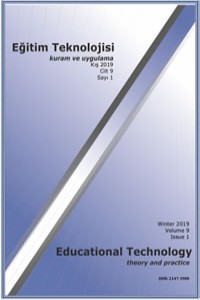BT ÖĞRETMENLERİNİN CEVRİMİÇİ FORUMLARDA TARTIŞTIKLARI KONULARIN KÜLTÜRLER ARASI KARŞILAŞTIRMASI: TÜRKİYE-İNGİLTERE ÖRNEĞİ
Abstract
Bu çalışmanın amacı; BT öğretmenlerinin
çevrimiçi forumlarda tartıştıkları konuları incelemek ve bu tartışmalardaki
kültürel farklılaşmayı ortaya koymaktır. Bu amaçla; İngiltere’deki TES (Times
Education Supplement) adlı kuruluşun üyesi olan BT öğretmenlerinin kuruluş
bünyesinde yer alan çevrimiçi tartışma ortamlarındaki paylaşımları ile
ülkemizdeki BT öğretmenlerinin memurlar.net adlı çevrimiçi tartışma forumundaki
paylaşımları incelenmiştir. Araştırma kapsamında iki tartışma forumunda
2005-2018 yılları arasında paylaşılan toplam 12107 konu başlığı içerik
çözümlemesi ile incelenmiş, elde edilen sonuçlar betimsel istatistikî yöntemler
kullanılarak sunulmuştur. Yapılan içerik çözümlemesi sonucunda çevrimiçi
tartışma forumlarında BT öğretmenlerinin; alanları ile ilgili politik
düzenlemeleri, konu alanı-meslek bilgisi, becerisi ve davranışları; yaşanılan
sorunlar ve çözüm önerileri; BT öğretmenlerinin profesyonellik algıları;
mesleki gelişimleri ve öğrencilerin gelişimi konularında tartıştıkları
belirlenmiştir. İki ülke arasında en fazla; politik düzenlemeler, mesleki
gelişim ve profesyonellik algısı boyutlarındaki farklılıklar dikkati
çekmektedir. Buradan hareketle, ülkemizdeki BT öğretmenlerinin yürüttükleri
tartışmaların bir adım ötesine geçerek profesyonel olarak kim oldukları, neler
yapabildikleri ve daha nitelikli öğrenciler yetiştirmek için neler
yapabileceklerine daha fazla odaklanmaları gerekmektedir.
References
- Atal-Köysüren, ve Deryakulu, D. (2017). Eğitim politikalarındaki değişimlerin bilişim teknolojileri öğretmenlerinin duyguları üzerindeki etkisi. Eğitim ve Bilim, 42(190), 67- 87.
- Coleman, M. R., Gallagher, J. J., & Job, J. (2012). Developing and sustaining professionalism within gifted education. Gifted Child Today, 35(1), 27-36.
- Darling-Hammond, L. (2005). Teaching as a profession: Lessons in teacher preparation and professional development. Phi Delta Kappan, 87(3), 237-240.
- Day, C., Kington, A., Stobart, G., & Sammons, P. (2006). The personal and professional selves of teachers: Stable and unstable identities. British Educational Research Journal, 32(4), 601-616.
- Day, E. (2002). Me, my*self and I: personal and professional reconstructions in ethnographic research. FQS Forum: Qualitative Social Research, 3(3), 1‐23.
- Dede, C., Jass Ketelhut, D., Whitehouse, P., Breit, L., & McCloskey, E. M. (2009). A research agenda for online teacher professional development. Journal of Teacher Education, 60(1), 8-19.
- Delahunty, J. (2012). ‘Who am I?’: Exploring identity in online discussion forums. International Journal of Educational Research, 53, 407-420.
- Deryakulu, D., & Olkun, S. (2007). Analysis of computer teachers’ online discussion forum messages about their occupational problems. Educational Technology & Society, 10(4), 131-142.
- Englund, T. (1996). Are professional teachers a good thing. In I. F. Goodson, & A. Hargreaves (Eds.), Teachers’ Professional Lives, London: Falmer Press.
- Evans, L. (2011). The ‘shape’of teacher professionalism in England: Professional standards, performance management, professional development and the changes proposed in the 2010 White Paper. British Educational Research Journal, 37(5), 851-870.
- Fraenkel, J. R., & Wallen, N. E. (2006). How to design and evaluate research in education. United States of America: The Mc-Graw-Hill Companies.
- Goos, M. E., & Bennison, A. (2008). Developing a communal identity as beginning teachers of mathematics: Emergence of an online community of practice. Journal of Mathematics Teacher Education, 11(1), 41-60.
- Hargreaves, A., & Goodson, I. (1996). Teachers’ professional lives: Aspirations and actualities. In I. Goodson & A, Hargreaves (Eds.), Teachers’ Professional Lives, (1-17), London: Falmer Press.
- Hiebert, J., Gallimore, R., & Stigler, J. W. (2002). A knowledge base for the teaching profession: What would it look like and how can we get one? Educational Researcher, 31(5), 3-15.
- Hildebrandt, S. A., & Eom, M. (2011). Teacher professionalization: Motivational factors and the influence of age. Teaching and Teacher Education, 27(2), 416-423.
- Hou, H. T., Sung, Y. T., & Chang, K. E. (2009). Exploring the behavioral patterns of an online knowledge-sharing discussion activity among teachers with problem-solving strategy. Teaching and Teacher Education, 25(1), 101-108.
- Hough, B., Smithey, M., & Evertson, C. (2004). Using computer-mediated communication to create virtual communities of practice for intern teachers. Journal of Technology and Teacher Education, 12, 361-386.
- Irwin, B., & Hramiak, A. (2010). A discourse analysis of trainee teacher identity in online discussion forums. Technology, Pedagogy and Education, 19(3), 361-377.
- Ivanic, R. (1998) Writing and Identity: The discoursal construction of identity in academic writing. Amsterdam: John Benjamins.
- Jamissen, G., & Phelps, R. (2006). The role of reflection and mentoring in ICT teacher professional development: Dialogue and learning across the hemispheres. Teacher Development, 10(3), 293-312.
- Lock, J. V. (2006). A new image: Online communities to facilitate teacher professional development. Journal of Technology and Teacher Education, 14(4), 663-678.
- McKernan, J. (2008). Curriculum and imagination: Process theory, pedagogy and action research. New York: Routledge.
- Merriam, S. B. (2009). Qualitative research: A guide to design and implementation (Revised and expanded from qualitative research and case study application in education). San Francisco: Jossey-Bass/Wiley.
- Prestridge, S. (2010). ICT professional development for teachers in online forums: Analysing the role of discussion. Teaching and Teacher Education, 26(2), 252-258.
- Sachs, J. (2001) Teacher professional identity: Competing discourses, competing outcomes, Journal of Education Policy, 26(2), 149-161.
- Sachs, J. (2016). Teacher professionalism: Why are we still talking about it?. Teachers and Teaching, 22(4), 413-425.
- Schuck, S., & Foley, G. (1999). Viewing mathematics in new ways: Can electronic learning communities assist. Mathematics Teacher Education and Development, 1(1), 22-37.
- Selwyn, N. (2000). Creating a “Connected” community? Teachers' use of an electronic discussion group. Teachers College Record, 102(4), 750-78.
- Shulman, L. S. (1998). Theory, practice and the education of professionals. The Elementary School Journal, 98(5), 511-526.
- Sutherland, L., Howard, S., & Markauskaite, L. (2010). Professional identity creation: Examining the development of beginning preservice teachers' understanding of their work as teachers. Teaching and Teacher Education, 26(3), 455-465.
- Wardoyo, C., Herdiani, A., & Sulikah, S. (2017). Teacher Professionalism: Analysis of professionalism phases. International Education Studies, 10(4), 90-100.
Details
| Primary Language | Turkish |
|---|---|
| Journal Section | Articles |
| Authors | |
| Publication Date | January 31, 2019 |
| Published in Issue | Year 2019 Volume: 9 Issue: 1 |

